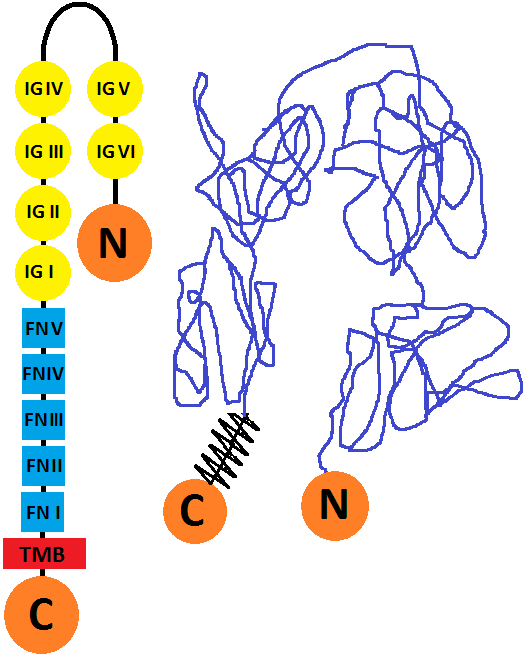Creative Biolabs is one of the leading providers of custom antibody generation and development services. We specialize in the generation of antibodies against a wide range of targets for R&D, diagnostic, and therapeutic applications. Currently, we have launched a series of in vitro diagnostic (IVD) antibody development services targeting numerous diagnostic biomarkers of human diseases. Here, we focus on the L1CAM as a marker of ovarian cancer.
 Fig.1 Schematic structure of L1CAM showing its domains.1
Fig.1 Schematic structure of L1CAM showing its domains.1
L1CAM, which is a transmembrane protein member of the L1 protein family, is encoded by the L1CAM gene. The protein (200-220 kDa) is a neuronal cell adhesion molecule with a strong implication in cell migration, adhesion, neurite outgrowth, myelination and neuronal differentiation. It also plays a key role in treatment-resistant cancers due to its function. Mutations in the L1 protein are the cause of three neurological syndromes known by the acronym CRASH (corpus callosum hypoplasia, retardation, aphasia, spastic paraplegia, and hydrocephalus).
It has been noticed there's L1CAM overexpression in all types of cancer cells, which has been associated with poor prognosis, tumor progression, and metastasis. This up-regulation may not be necessarily associated with mutations in L1 transcription factors. L1CAM's diverse functions make tumor cells more aggressive and resistant. Once tumor cells become anchorage-independent and migratory, due to L1 up-regulation, they leave the tissue where they belong and migrate through the capillaries to other organs.
L1CAM Marker of Ovarian Cancer
Overexpression of L1CAM has been observed for various carcinomas and correlates with poor prognosis and late-stage disease. In vitro, L1CAM enhances proliferation, cell migration, adhesion, and chemo-resistance. L1CAM is highly expressed in ovarian and endometrial carcinomas. The extracellular part of the full-length L1CAM is subject to membrane-proximal cleavage, which generates a soluble form of ∼200 kDa soluble L1CAM (sL1CAM). L1CAM cleavage and release of the soluble molecule have been shown to promote migration, invasion, and protection from apoptosis of cancer cells in vitro. Soluble L1CAM can be detected in serum and ascitic fluid of ovarian and endometrial carcinoma patients.
Importantly, L1CAM-expressing tumors show a highly invasive phenotype associated with restricted tumor resectability at primary debulking surgery and increased lymphogenic spread. Soluble L1CAM proved to be a marker for poor progression-free survival and chemo-resistance. L1CAM expression contributes to the invasive and metastatic phenotype of serous ovarian carcinoma. L1CAM expression and shedding in the tumor microenvironment could contribute to enhanced invasion and tumor progression through increased IL-1β production and NF-κB activation.
IVD Antibody Development Service Targeting L1CAM Marker
Antibodies are core elements for antibody-based immunoassays for detecting and quantifying antigens of interest in all kinds of samples such as serum, urine, and tissue preparations. IVD antibodies are extensively used for disease screening, prognosis, and therapeutic monitoring. With our versatile IVD platform, Creative Biolabs is proud to develop novel L1CAM-specific antibody pairs from scratch to commercial IVD kits.
Our team consists of highly skilled and experienced scientists and professionals, fully dedicated and focused on the successful execution and completion of client projects. If you are interested in our services, please contact us to discuss your project needs.
Reference
- From Wikimedia: By BQUB16-Rjurado - Own work, CC BY-SA 4.0, without modification, https://commons.wikimedia.org/wiki/File:L1CAM_structure.png.
For Research Use Only.